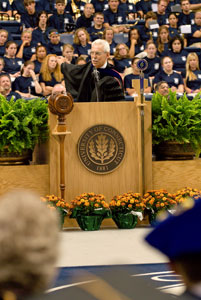  |
| HOME | THIS ISSUE | CALENDAR | GRANTS | BACK ISSUES | < BACK | NEXT > |
Turvey urges freshmen to study long and hard by Sherry Fisher - September 5, 2006
|
||||
|
The college journey is a matter of acquiring skills, psychology professor Michael Turvey told new students during Convocation in the Harry A. Gampel Pavilion Aug. 25. "This is your most important, immediate task," he said. "You need to be able to think, speak, and write clearly," he said. "You need to be able to reason critically. You ought to at some point be competent at organizing an argument, in putting forth a proposition, in advancing a hypothesis with precision and brevity." Turvey, a Board of Trustees Distinguished Professor, was the main speaker during Convocation, the University's first formal event of the 2006-2007 academic year. Freshmen face uncertainty, Turvey said. "The uncertainty lies in the fact you are not yet secure in what your major will be. You're not yet confident in what body of knowledge you will declare as your area of expertise. You will tread haltingly in this direction. You will change directions." What is certain, he emphasized, is the skills students will need. "You should be a person who learns to think and work independently, and yet at the same time develop those skills that allow you to be a good team member and to work cooperatively on problems and solutions," he said. "You should also have the ability to see those particular connections, intersections that do exist among the disciplines, that do occur among ideas, and that are present among various cultures." President Philip E. Austin and other senior administrators, members of the Board of Trustees, deans, and faculty members - all in academic regalia and accompanied by the UConn Marching Band - presided over the ceremony, welcoming several thousand new students and their families to the University community. The University entitles students to knowledge, but not to grades, said Turvey who during his 42 years of teaching has taught more than 25,000 undergraduates. "Grades have to be earned. And it's awfully important for freshmen that you recognize precisely what your entitlements are and what they are not." Turvey urged students to take the general education program seriously. "It is the program that makes you cultured," he said. "If there is anything you should leave with at the end of four years, it should be a culture of education, a culture of knowledge." He said gen ed courses "will let you in to the secrets of philosophy, of art, of the sciences, of the technologies. They will let you into the ways of conquering the world around you and let you see what's possible. They will provide you with the basic skills upon which everything else is founded."
"It allows you to be one-on-one with a person who has studied hard and long," he said. "Don't be slow in taking advantage of this possibility. Use it, and use it often." He told students to "Learn to love your textbooks. Textbooks are your fundamental basis for knowledge. You must learn to work a textbook. You must learn to respect it." Knowledge is "encrypted at the level of paragraphs and sentences," he said. "Be wary, be careful. Your reading must be an entirely different level. You can no longer say, 'I read the book.' We want to know, 'Did you crack those sentences? Did you struggle with the concepts?'" He urged students to practice time management. "When you have free time, study," he said. "Time management is a skill you'll need for life. Acquire it now. Begin today - 10 minutes here five minutes there." When the material gets harder, "you must attack it even more," Turvey said, noting that knowledge is not easy to come by. "The common response is to back off. As it gets harder, students tend to find other things to do, or complain it's too hard. Be persistent, be tenacious." President Austin noted that words like "transformation" or "renaissance" are often used in connection with UConn. "We are certainly in the midst of great change," he said. "Our buildings are physical manifestations of a great university in transition. "But there is a more important transformation about to start," he added. "The one that has just begun in your lives and will go on for the next several years." He told students they have a role in shaping the institution. "You are helping to shape the institution's destiny," he said, "just as much as we're helping to shape yours." |
| ADVANCE HOME UCONN HOME |

 Turvey advised students to take advantage of professors' office hours.
Turvey advised students to take advantage of professors' office hours.